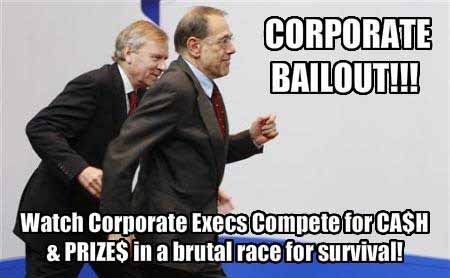
Publisher:
Bonnie King
CONTACT:
Newsroom@Salem-news.com
Advertising:
Adsales@Salem-news.com

~Truth~
~Justice~
~Peace~
TJP
Sep-05-2011 15:44

 TweetFollow @OregonNews
TweetFollow @OregonNews
Corporate Personhood
Ralph E. Stone Salem-News.comAmending the U.S. Constitution via the first part of Article V is probably the most manageable means to eliminate corporate personhood.
 Special thanks: veteranstoday.com |
(SAN FRANCISCO) - On January 10, the Supreme Court in Citizens United v. Federal Election Commission invalidated the Bipartisan Campaign Reform Act of 2002, a federal law which prohibits corporations and unions from using their general treasury funds to make independent expenditures for speech that is an “electioneering communication” or for speech that expressly advocates the election or defeat of a candidate. (2 U.S.C. §441b).
The Supreme Court ruled that the "government may not suppress political speech on the basis of the speaker’s corporate identity." According to the Supreme Court, its ruling is a logical extension of a long line of decisions affording First Amendment rights to corporations, but is clearly a set back for campaign finance law.
What is assumed in the Citizens United decision is that corporations are natural persons within the meaning of Section 1 of the Fourteenth Amendment of the Constitution and have, therefore, First Amendment rights. Ironically, the Fourteenth Amendment was designed to overturn that portion of theDred Scott Decision, which ruled that blacks were not and could not become citizens of the United States or enjoy any of the privileges and immunities of citizenship. I cannot imagine the authors of the Fourteenth Amendment would find corporate personhood therein.
The Fourteenth Amendment states: "All persons born or naturalized in the United States, and subject to the jurisdiction thereof, are citizens of the United States and of the State wherein they reside. No State shall make or enforce any law which shall abridge the privileges or immunities of citizens of the United States; nor shall any State deprive any person of life, liberty, or property, without due process of law; nor deny to any person within its jurisdiction the equal protection of the laws."
 |
The corporate personhood legal concept has been codified: "In determining the meaning of any Act of Congress, unless the context indicates otherwise -- the words "person" and "whoever" include corporations, companies, associations, firms, partnerships, societies, and joint stock companies, as well as individuals." (1 U.S.C. §1)
How did a corporation become a natural person? Initially, the privilege of incorporation was granted selectively to enable activities that benefited the public, such as construction of roads or canals. Corporate status enabled shareholders to profit and gave limited liability to directors, officers, and shareholders for the corporation's debts and obligations. For over 100 years after the American Revolution, legislators maintained tight control over corporate chartering.
Then came the controversial 1886 Supreme Court decision in Santa Clara County v. Southern Pacific Railroad. Although the Supreme Court supposedly did not make a direct ruling on the question of "corporate personhood," the misleading notes of a clerk finding corporate personhood were incorporated in the Court's decision. Whether this is myth or reality doesn't matter at this point. The Supreme Court has often cited this case for the proposition that a corporation is a "natural person." Thus, a precedent was set.
The Santa Clara County case became the basis for a long line of court cases giving a corporation personhood. It is now firmly embedded in the law and neither the Supreme Court nor Congress is likely to overturn 123 years of precedent. The corporate personhood debate now centers on what subset of rights of natural persons should also be afforded to corporations. Proponents of corporate personhood have argued successfully over the years that corporations, as representatives of their shareholders, should have the same rights as natural persons, as for example, the First Amendment rights determined by the Supreme Court in Citizens United.

Amending the U.S. Constitution via the first part of Article V is probably the most manageable means to eliminate corporate personhood.
The first part of Article V states: "The Congress, whenever two thirds of both Houses shall deem it necessary, shall propose Amendments to this Constitution,..." This was done to pass the Eleventh, Sixteen, and Twenty-Sixth Amendments. -- MovetoAmend.org -- that proposes to amend the Constitution to "establish that money is not speech, and that human beings, not corporations, are persons entitled to constitutional rights." Perhaps, all those appalled by the concept of corporate personhood should support this movement.
What would change if corporations did not have personhood? After corporate personhood is abolished, new legislation will be possible. Here are a few examples: If “corporate persons” no longer had a First Amendment right of free speech, we could prohibit all corporate political activity, such as lobbying, and the billions of dollars in contributions to political candidates and parties. If “corporate persons” were not protected against search without a warrant under the Fourth Amendment, then corporate managers could not turn OSHA and the EPA inspectors away if they make surprise, unscheduled searches. If “corporate persons” were not protected against discrimination under the 14th Amendment, corporations like Wal-Mart could not force themselves into communities that do not want them.
The Supreme Court created a legal fiction and now the fiction is ruling us. Imagine how different the economic and political landscape of the United States would be without the Santa Clara County decision and its progeny.
 Salem-News.com writer Ralph E. Stone was born in Massachusetts. He is a graduate of both Middlebury College and Suffolk Law School. We are very fortunate to have this writer's talents in this troubling world; Ralph has an eye for detail that others miss. As is the case with many Salem-News.com writers, Ralph is an American Veteran who served in war. Ralph served his nation after college as a U.S. Army officer during the Vietnam war. After Vietnam, he went on to have a career with the Federal Trade Commission as an Attorney specializing in Consumer and Antitrust Law. Over the years, Ralph has traveled extensively with his wife Judi, taking in data from all over the world, which today adds to his collective knowledge about extremely important subjects like the economy and taxation. You can send Ralph an email at this address stonere@earthlink.net
Salem-News.com writer Ralph E. Stone was born in Massachusetts. He is a graduate of both Middlebury College and Suffolk Law School. We are very fortunate to have this writer's talents in this troubling world; Ralph has an eye for detail that others miss. As is the case with many Salem-News.com writers, Ralph is an American Veteran who served in war. Ralph served his nation after college as a U.S. Army officer during the Vietnam war. After Vietnam, he went on to have a career with the Federal Trade Commission as an Attorney specializing in Consumer and Antitrust Law. Over the years, Ralph has traveled extensively with his wife Judi, taking in data from all over the world, which today adds to his collective knowledge about extremely important subjects like the economy and taxation. You can send Ralph an email at this address stonere@earthlink.net
Articles for September 4, 2011 | Articles for September 5, 2011 | Articles for September 6, 2011

googlec507860f6901db00.html


Salem-News.com:

Terms of Service | Privacy Policy
All comments and messages are approved by people and self promotional links or unacceptable comments are denied.
Hank Ruark September 8, 2011 11:22 am (Pacific time)
To all: Footnoe: The key case mentioned -- Santa Clara County-- was actually centred on less than 2% of assets involved, the cost of fences on right-of-way as subject to taxation...as I recall. Perhaps Ralph can expand this point which makes entirely clear the level of greed driving this matter from the start. Clearing massive old files here in preparation for "my next assignment", but will search for clipped story making clear self-interest of former judge acting as clerk, and setting up court record leading to false precedent.
Hank Ruark September 7, 2011 7:35 pm (Pacific time)
Ralph et al:
Excellent overall review, and sets up now precisely what must somehow happen to remedy the "arranged" case-notes by compromised former judge which has created the overly-stated false foundation for the original precedent-setting court statement.
COLLI September 5, 2011 7:43 pm (Pacific time)
Excellent article Ralph. If the corporations and the banks that own them were not already running our government common sense and the desire to protect the individual citizen above all else, would rule. Nothing more need be said.
[Return to Top]©2026 Salem-News.com. All opinions expressed in this article are those of the author and do not necessarily reflect those of Salem-News.com.